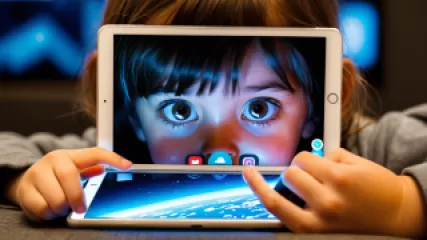How Excessive Child Media Exposure Can Harm Mental Health
In today's digital age, where screens have become an integral part of our daily lives, the impact of excessive child media exposure on mental health is a growing concern. As an opinion piece, I aim to explore the detrimental effects that prolonged media consumption can have on the well-being of our children and why we need to address this issue with urgency.
The Allure of Digital Media and Its Consequences
Children today are growing up in a world where smartphones, tablets, and various digital devices are omnipresent. The convenience and accessibility of these technologies have made them a constant companion in the lives of our young ones, often replacing traditional forms of play, social interaction, and meaningful engagement. While the benefits of digital media, such as educational resources and connectivity, cannot be overlooked, the overindulgence in these activities can have a profound impact on the mental health and development of children.
Attention Span and Cognitive Function
One of the primary concerns surrounding excessive child media exposure is the impact on attention span and cognitive function. Studies have shown that prolonged screen time can lead to diminished focus, difficulty in task completion, and reduced ability to engage in deeper, more analytical thinking. The constant stimulation and rapid shifting of attention required by digital media can hinder the development of essential executive functions, such as impulse control, planning, and decision-making. As a result, children may struggle to maintain concentration in academic settings and find it challenging to engage in activities that demand sustained attention and critical thinking.
Social and Emotional Development
Another significant concern is the impact of media consumption on children's social and emotional development. The virtual world, while providing a sense of connection, often lacks the depth and nuance of face-to-face interactions, which are crucial for developing empathy, emotional regulation, and interpersonal skills. Children who spend an excessive amount of time immersed in digital environments may have fewer opportunities to engage in real-world social interactions, leading to a diminished ability to read social cues, communicate effectively, and form meaningful relationships.
Furthermore, the constant exposure to idealized representations and curated personas on social media can lead to feelings of inadequacy, low self-esteem, and body image issues in young individuals. This can have lasting consequences on their emotional well-being and sense of self-worth, potentially contributing to the development of mental health problems such as anxiety and depression.
Physical Health Implications
Excessive media exposure not only affects children's mental health but also their physical well-being. Prolonged sedentary behavior associated with screen time can lead to a decline in physical activity, increased risk of obesity, and reduced overall physical fitness. Additionally, the blue light emitted by digital devices can disrupt the natural sleep-wake cycle, leading to sleep deprivation and further exacerbating mental health concerns.
The Importance of Digital Detox and Balanced Media Consumption
In light of these concerning trends, it is crucial to advocate for a more mindful and balanced approach to children's media consumption. The concept of a "digital detox" has gained traction as a way to help children and families reclaim their time, attention, and mental well-being. By setting clear boundaries, implementing screen-free zones, and encouraging alternative activities that foster physical, social, and emotional development, we can mitigate the adverse effects of excessive media exposure and promote a healthier, more well-rounded upbringing for our children.
Fostering Healthy Habits and Mindful Engagement
Establishing a healthy media consumption routine is not an easy task, but it is a necessary one. Parents and caregivers play a crucial role in guiding children towards more mindful and balanced media use. This may involve setting time limits, curating age-appropriate content, and encouraging offline activities that stimulate physical, cognitive, and social development. By modeling healthy digital habits and fostering open dialogues about the impact of media, we can empower children to develop a more nuanced understanding of their relationship with technology and its influence on their well-being.
Advocating for Change and Promoting Mental Health Awareness
Beyond individual actions, it is essential to advocate for systemic changes that prioritize the mental health and well-being of our children. This may involve collaborating with educational institutions, policymakers, and tech companies to implement policies and programs that promote digital literacy, media literacy, and mental health resources within schools and communities. By raising awareness and advocating for the necessary changes, we can create a more supportive environment that empowers children to navigate the digital landscape in a healthy and constructive manner.
Conclusion: Reclaiming Childhood and Prioritizing Mental Health
The impact of excessive child media exposure on mental health is a pressing issue that demands our attention and action. As we navigate the ever-evolving digital landscape, it is our responsibility as parents, educators, and community members to ensure that our children's well-being remains the top priority. By fostering a balanced and mindful approach to media consumption, promoting alternative activities that nurture physical, social, and emotional development, and advocating for systemic changes, we can work towards creating a future where our children can thrive, both mentally and physically.
The path forward may not be an easy one, but the well-being of our children is worth the effort. Let us come together, as a society, to reclaim the essence of childhood and prioritize the mental health and overall development of the next generation.






